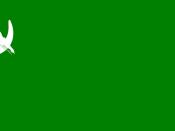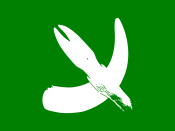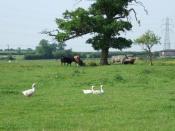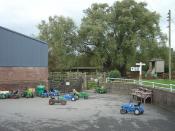Animal Farm is an animal satire through which Orwell indirectly criticizes the Russian Communism, Stalinism by using animals to portray the different classes of people. The aim of satire is to criticize the object of attack, teaching a moral indirectly with a humorous tone, in the animal satire, the author uses animals instead of human beings and places his animals in human situations. Thus Orwell is able to attack on the political ideas and entertain the reader at the same time.
The first chapter of the book introduces old Major, the prize White boar, telling the animals about his dream. He says he dreams of a new life for the animals and encourages them to take action against the farmer, Mr. Jones. Shortly afterwards old Major dies, the animals rebel. They expel Jones and rename the farm as Animal Farm. All the animals participate in the rebellion. The pigs, who consider themselves the cleverest of all, assume the administration of the farm.
They then write the Seven Commandments of Animalism on the wall:1."Whatever goes upon two legs is an enemy."2."Whatever goes upon four legs, or has wings is a friend" changes into:3."No animal shall wear clothes."4."No animal shall sleep in a bed"5."No animal shall drink alcohol"6."No animal shall kill any other animal"7."All animals are equal"After this war, Snowball spends all his time trying to improve life in the farm, one of his ideas is to build a windmill; another is to educate the young. Although Napoleon seems to oppose the idea of the windmill, soon afterwards he drives Snowball out of the farm by force and takes over the project as his own. After Snowball has left, life for the animals gets harder and harder. The pigs and the dogs are cruel leaders and do no work to help the farm, despite this they still take whatever they want and when someone complains, they just claim that they need it because they are smarter, which the animals believed. It was agreed without further argument that the milk and the apples should be reserved for the pigs alone.
The reader gets an ironic viewpoint because of they see and understand the plots of the pigs which the animals so naively miss. Thus, the reader feels sympathy for the lower animals. In addition, while the reader gets annoyed at the situation, the animals are merely confused. The ironic distance emphasizes the corruption in human nature. Though old Major starts with good intentions, irony goes hand in hand with satire to reveal that these good intentions are certain to be manipulated into evil intentions by Napoleon, creating the total opposite of the "promised land."Napoleon uses Snowball as a scape-goat to force the animals to both be more loyal, and to work harder. He claims that Snowball comes and goes secretly to harm the animals and to steal and sabotage. Later on, he is accused of destroying the windmill and of being in league with Mr. Jones. In time, the pigs start to do trade with human beings. As the pigs acquire more human habits, the Seven Commandments are modified to justify the pigÃÂs actions.
Just before his death, old Major warns the animals against mankind: "Man serves the interests of no creature except himselfÃÂ . All men are enemiesÃÂ .And remember also that in fighting against Man; we must not come to resemble himÃÂ . Do not adopt his vicesÃÂ . And, above all, no animal must ever tyrannize over his own kind ÃÂ . All animals are equal". However, the reader observes that the pigs undergo a gradual change. They start to live in the farmhouse, adopting human vices. They start to walk with whips in their hands. Napoleon's insistence on the fact that the windmill should be built and re-built several times is suggestive of the establishment of his tyranny. His sole aim is to keep the masses busy so that he can easily rise to absolute power to terrorize his own kind. As time passes, Napoleon starts to lead a pleasant life while the working class is suffering. His ruling body turns out to exploit the animals more than Jones and the others did. In the end, irony reaches its peak. Old Major's doctrines are totally reversed.
Several years pass by and during this time the windmill collapses three times. The pigs put the blame on Snowball and execute some of the animals for being in cooperation with him. During this time, napoleon becomes extremely self-important; he only appears on rare occasions. As the animals sell their products to their neighboring farmers, the farm prospers. However, only the pigs and the dogs benefit. At this point, the final transformation of the pigs starts. They are now walking on two feet and carrying whips. By this time the Seven Commandments had gradually been altered displays another kind of irony. When Squealer, the propaganda agent, changes the Commandments one by one, he, in fact, changes the meaning underlying the revolution completely. The Commandments come to mean just the opposite of what old Major intended to mean in the beginning:1."Whatever goes upon two legs is an enemy."2."Whatever goes upon four legs, or has wings is a friend" changes into:"Four legs good, two legs better."3."No animal shall wear clothes."4."No animal shall sleep in a bed"changes into:"No animal shall sleep in a bed with sheets."5."No animal shall drink alcohol"changes into:"No animal drink alcohol to excess."6."No animal shall kill other animal"changes into:"No animal shall kill other animal without cause."7.7. "All animals are equal"changes into:"All animals are equal but some animals are more equal than others."These Commandments have been changed in order to justify what Napoleon and the other pigs do. However, none of the animals but Benjamin discusses much about the changes because they donÃÂt remember the original nature of them.
The pigs have started to live in the house, wear clothes and use human technology. In the final chapter, the pigs invite the other farmers to dinner. In his brief speech Napoleon says that "their sole wish, now and in the past, was to live at peace and in normal business relations with their neighbors." He adds that the animals' foolish customs will be "suppressed" and that "the name 'Animal Farm' will be "abolished." From then on the farm will be "known as 'The Manor FarmÃÂÃÂ. The other animals watching the pigs from outside and realize that they cannot tell the difference between the pigs and the men: "The creatures outside looked from pig to man, and from man to pig, and from pig to man again; but already it was impossible to say which was which".
Since the aim of satire is to criticize the object of attack, teaching a moral indirectly with a humorous tone, in the animal satire, the author uses animals instead of human beings and places his animals in human situations. Thus Orwell is able to attack on the political ideas and entertain the reader at the same time.
Bibliographygutenberg.net.au/ebooks01/0100011.txthttp://www.sparknotes.com/lit/animalfarm/http://books.google.com.au/books?id=SGAZdjNfruYC&dq=animal+farm&printsec=frontcover&source=bl&ots=vsK9ZimTOF&sig=ZqvLRdyQhU95Z3JNO2sWdLdun0s&hl=en&ei=t41ISuSlKY3WsgPSk_GQAQ&sa=X&oi=book_result&ct=result&resnum=2http://en.wikipedia.org/wiki/Animal_Farm





